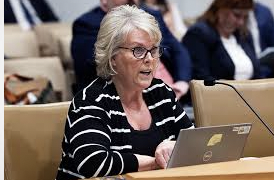The Missouri Independent reports
Ahmad Haynes and a handful of employees at BeLeaf Medical’s Sinse Cannabis site in St. Louis anxiously waited for the clock to hit 5 p.m.
He and his co-workers had gathered outside the St. Louis Public Library’s Barr branch, where they had cast their votes to unionize earlier that afternoon on Feb. 6. The election came after a hard-fought legal battle that began in September with their employer contesting their eligibility to unionize.
Minutes before 5 p.m., they all shuffled into a library conference room to hear the results.
“We all love our jobs, which is why we want the security behind having something like this in place,” Haynes, a post-harvest technician at Sinse, told The Independent.
However, just as the representative from the National Labor Relations Board was gathering up the votes to tally them, BeLeaf’s director of human resources, Marilyn Gleason, told him to wait.
She had spoken with the company’s attorney, she said, and BeLeaf wanted to continue to challenge 11 of employees’ eligibility to vote — out of the total 16 who voted.
Haynes’ jaw dropped, and the employees looked around in disbelief.
“I just could not believe they were doing it,” said Todd Rick, a former post-harvest specialist for Sinse Cannabis who says he was fired earlier this month. “But at the same time, I wasn’t surprised at all.”
Not long after he and other employees filed their petition to unionize in September, the company argued before the board that the employees aren’t manufacturer workers — they’re agricultural workers.
Agricultural laborers aren’t protected under the 1935 National Labor Relations Act, which ensures employees have the “fundamental right to seek better working conditions and designation of representation without fear of retaliation.”
On Jan. 25, Board Regional Director Andrea Wilkes issued a 13-page decision detailing why the employees are not agricultural workers and could cast votes in the unionization election.
The company’s challenge on Tuesday essentially asked Wilkes to rethink her decision.
The board representative asked Gleason why she wanted to challenge the votes after Wilkes had already deemed them eligible, and she said that’s what her attorney was advising her to do.
Beleaf Medical did not respond to The Independent’s multiple requests for comment.
Read more at



















